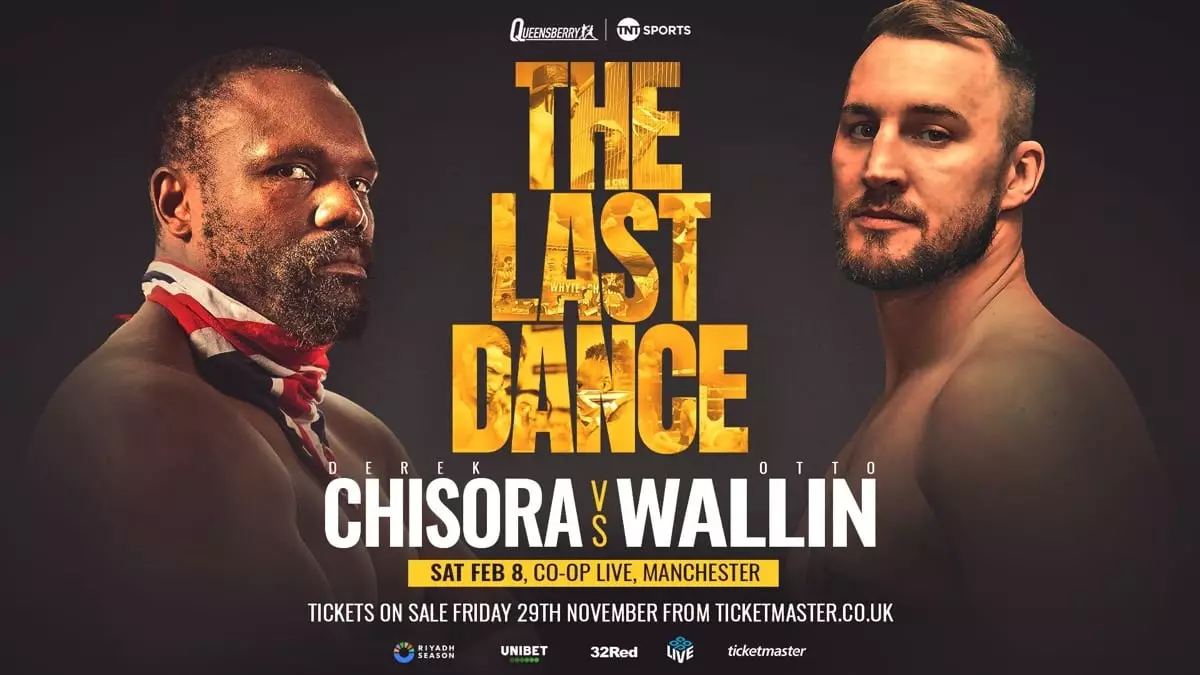Derek Chisora, the veteran heavyweight known for his rigorous approach to boxing, is scheduled to headline an intriguing match against Otto Wallin on February 8th at the Co-op Live Arena in Manchester, England. As Chisora, now 40 years old, embarks on what he terms his ‘Last Dance’, the boxing community is rife with skepticism. Critics question whether he should still be fighting, especially given his age and the significant toll the sport has taken on him throughout his career.
The longevity of a boxer’s career often prompts reflection on their legacy. Chisora’s professional record of 35 wins against 13 losses (with 23 knockouts) illustrates his experiences in the ring. However, his recent performances raise eyebrows. Many fans argue that Chisora’s fighting style has morphed into one characterized by a battle-weary demeanor, likening his approach to that of a “rusty tin man.” Observing him struggle against formidable opponents is often painful for fans to watch, and many are vocal about their desire to see him retire from the sport altogether.
With some fans feeling disillusioned, Chisora’s status as the headliner can be seen as controversial. It’s hard to justify placing a fighter with a considerable number of losses in such a prominent position, especially when younger talent waits in the wings with fresh energy and potential. Statistically, while Chisora has achieved considerable success, the narrative of fighting for relevance in a sport that often celebrates youth is compelling.
Originally slated to fight Jarrell Miller, a fighter criticized himself for being out of shape and over 300 pounds, Chisora is instead preparing to face Otto Wallin, an entirely different caliber of opponent. Wallin, who boasts a professional record of 27 wins and only 2 losses, represents a more technical challenge for Chisora. This change of opponent raises the stakes for Chisora, who has been accustomed to facing older, past-their-prime opponents in his last few fights.
Chisora’s previous victories over veterans like Joe Joyce and Gerald Washington may not have showcased his full potential, as both fighters showed signs of decline before stepping into the ring with Chisora. The transition from facing these fighters to Wallin, who maintains a high level of technical prowess and tenacity, will test Chisora’s capabilities in ways his recent fights did not. This marks a new chapter in Chisora’s journey where he will need to dig deeper than ever before.
Analyzing Chisora’s performances presents a mixed image. His last significant victory against top-tier heavyweight opponents dates back six years. The win against Carlos Takam, while remarkable, was partly the result of a once-in-a-blue-moon moment of brilliance rather than an exhibition of skill over a full fight. Since then, Chisora’s record against younger opposition has seen fewer glimmers of hope, with victories against aging fighters failing to instill confidence in fans.
Chisora himself shares his awareness of the heightened difficulty he faces against Wallin. His admission that this match will be “a hard victory to get” indicates both a respect for his opponent and a recognition of the added pressure of competing at an advanced age. The reluctance of younger fighters, such as Anthony Joshua, to engage in rematches with seasoned foes like Chisora only exacerbates the narrative surrounding his willingness to fight fueld by a desire for competitiveness rather than self-preservation.
Derek Chisora’s upcoming fight against Otto Wallin is more than just another match; it is a litmus test for the heavyweight division. It encapsulates the delicate balance between honoring a seasoned boxer’s past and recognizing the need for progression within the sport. For many, this reflects a wider commentary on the culture of boxing—one that sometimes favors nostalgia over the fresh talent that invigorates the sport’s future.
Ultimately, as fight night approaches, the boxing world watches closely not just to see if Chisora can defy his critics, but to analyze the implications of veteran fighters continuing to occupy the main stage in an unforgiving sport. As Chisora embarks on what he calls his ‘Last Dance,’ fans are left to ponder whether he will be the last of a generation or if his journey will spark new discussions about age, skill, and the relentless pursuit of glory in boxing.

